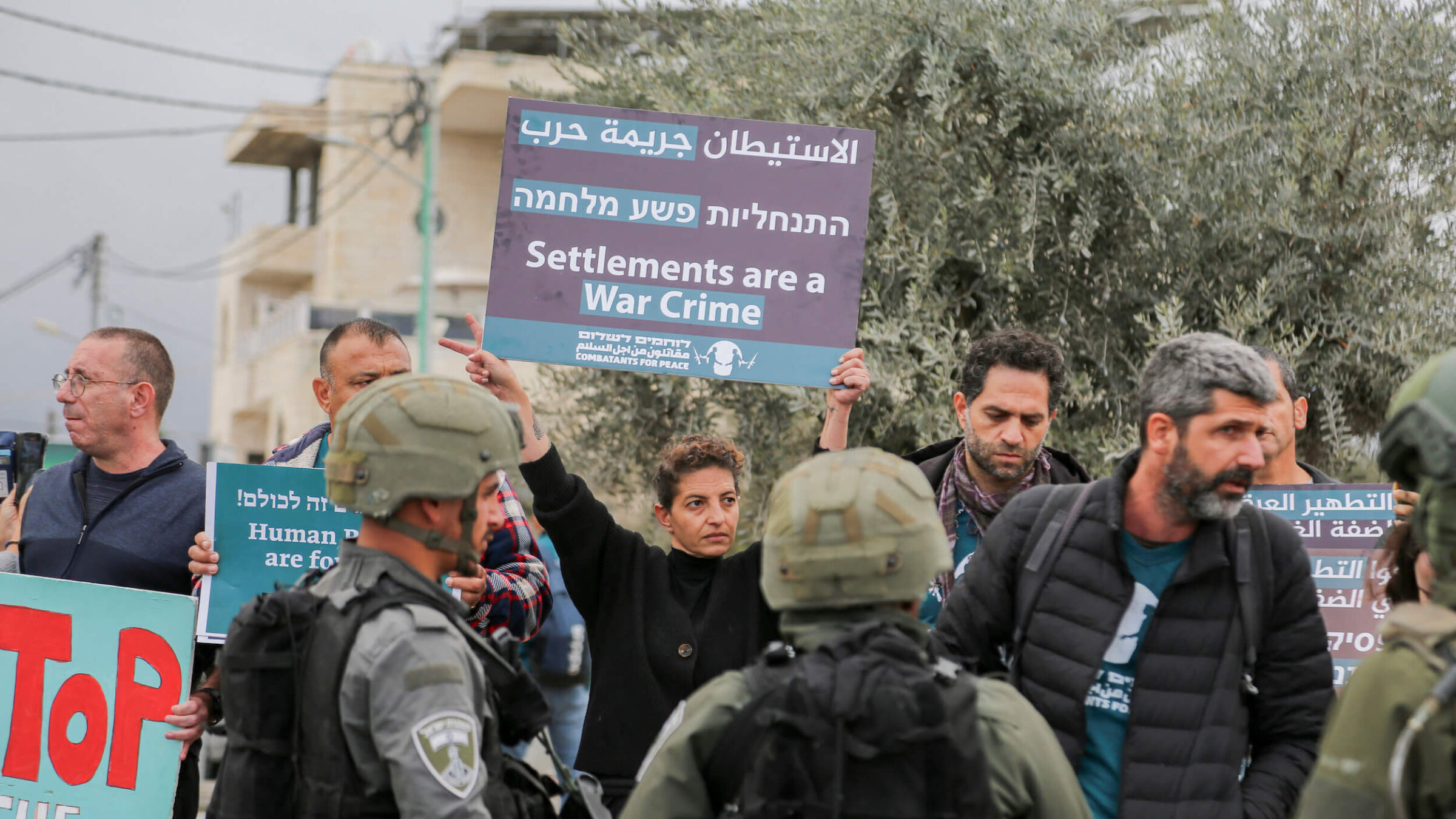Israel’s reputation is in free fall. One radical change could help
Pro-Israel groups must abandon the idea that criticism of Israel is verboten, and speak out against settler violence

Israeli and Palestinian activists argue with members of Israel’s security forces during a protest against Israeli settler violence at the north entrance of Beit Jala, near Bethlehem in the occupied West Bank, on Nov. 14. Photo by Mosab Shawer/Middle East Images via AFP
Israeli settlers spent months ramping up a campaign of terror against Palestinians in the West Bank — torching mosques, Qurans and farmland; attacking innocent civilians; and defacing IDF bases — before Prime Minister Benjamin Netanyahu even weakly condemned these “riots” for violating Israeli law. And that statement, issued on Sunday, only came because of international outrage.
If you want to understand why Americans are abandoning Israel, that long silence is your answer. Israel’s opponents frame the state as hell-bent on ridding the land of Palestinians by any means necessary, and the American public increasingly believe them. When Israel’s leaders and supporters turn a blind eye to lawless settlers, and the Palestinian suffering they create, that belief is reinforced.
For that to change, the response to settler violence has to change. Israel and its supporters must try to expunge this extremism from its circles.
That will not be easy, because settler violence is not a new phenomenon.
For the last 50 years, a radical ideology preaching Israeli dominance, and advocating Palestinian expulsion, has spread among settlers’ ranks. And they have come to expect impunity for extremist acts, because for much of that time, Israeli leadership failed to impose strict or meaningful consequences.
The attacks hit a fever pitch in the last two years, reaching an all-time high this October. In one notable example from two years ago, swaths of settlers rampaged through the Palestinian village of Huwara, leaving one Palestinian dead, about 100 injured and the entire town ablaze. The Israeli army did not intervene, and hardly anyone was punished.
The fact that extremists like the far-right cabinet ministers Itamar Ben-Gvir and Bezalel Smotrich — who often defend settlers in these cases — are prominently serving in Israel’s government indicts the Jewish state even further.
I understand that criticizing the state of Israel is a big no-no among pro-Israel organizations, which usually excuse their silence by saying they do not comment on domestic Israeli affairs. But this inaction is de facto acceptance. It’s a long-standing norm that needs to change.
In Tablets Shattered: The End of an American Jewish Century and the Future of Jewish Life, Joshua Leifer traces this loyalty to the 1967 Six-Day War, which provoked a broad deepening of Zionist sentiment among American Jews. The result was a relationship in which diaspora supporters of Israel were expected to support the state without criticism — because criticism was seen as playing into the hands of Israel’s enemies, who had so recently posed an existential threat to the state’s continuance.
The overwhelming power of that expectation was perhaps best shown in the experience of Elie Wiesel — the Nobel Prize-winning human rights defender who survived the Holocaust — who was met with outrage when he tried to critique Israeli treatment of Palestinians in the West Bank in the 1970s, particularly taking aim at settlement expansion.
“Wiesel was so upset by the Israeli reaction that he made a pledge to himself never to criticize Israel again,” writes Joseph Berger in his 2024 biography Elie Wiesel: Confronting the Silence. “And he never did.”
Against this backdrop, for pro-Israel groups and advocates to stand against settler violence is no simple choice — but it is doable.
The American Jewish Committee consistently calls out acts of settler violence, urging accountability and punishment. Other groups — such as the Anti-Defamation League — did the same in prior years, although the drop-off of such advocacy over the last few years has been stark.
But much remains to be done, because the silent devotion to Israel by generations past does not work today. Not for Americans at large, and certainly not for young American Jews.
“For an older generation of American Jews, a mythologized vision of a progressive, social democratic Israel served as a source of moral inspiration,” Leifer writes in Tablets Shattered. “That view is much less prevalent today.”
While many young Jews still view Israel in such a light, Leifer explains, increasing numbers “have only known Israel as an authoritarian state and regional military power hurtling down a path of ever more extreme ethnonationalism.”
Pairing these conceptions with countless videos depicting masked Israelis brutalizing Palestinians and ransacking their properties in the West Bank, in addition to the devastation of the war in Gaza, it is no wonder why public opinion on Israel is in free fall.
American sympathy for Israel hit a 25-year low in March 2025. Views of Israel and its government worsen each year. Even American Jews are drifting — with 41% opposing more U.S. military aid to Israel and 39% believing Israel committed genocide against Palestinians in Gaza.
The violence in the West Bank is almost certainly not the primary factor in that slide. But silence on it suggests that Israeli violence against Palestinians is acceptable — a stance that needs urgent and public correcting.
Condemnation is a necessary step, but words will not be enough to change the minds of opponents of the Jewish state. More crucially, supporters of Israel need to start taking steps to systematically combat extremism.
First, they must show zero tolerance for those who excuse or minimize crimes like those committed by settlers in the West Bank. Words without actions are meaningless, so pro-Israel groups must take steps to weed out those espousing views within their own community that align with the extremism now rife within settlement communities.
Second, they must unequivocally condemn violent rhetoric and actions against Palestinians. During the war against Hamas, for example, slogans like “no innocents in Gaza” and jokes mocking starving Palestinians ran rampant on social media from Israelis, including many Knesset members. Some were echoed by Israel’s supporters abroad. Pro-Israel groups must reject such rhetoric, as it applies to the West Bank as well as Gaza, immediately and forcefully.
Third, they must recognize Israel’s failure to subdue extremists and demand real accountability. They must demand investigations, prosecutions and punishments for violent settlers, insist that the Israeli government follow its own laws, and be prepared to impose consequences if those calls go unmet.
Claiming moral superiority while accepting extremism only reinforces distrust in Israeli narratives. Moreover, extremism of this flavor endangers the Jewish state itself by prolonging the conflict and degrading law and order.
This is not the behavior of a country committed to peace, justice and democracy — and the American public sees that. The absolutist narrative of total Israeli innocence is not only materially untrue but also entirely unconvincing.
Now is the time to pivot on the pro-Israel playbook and stand up for what we profess to care about. What Americans are looking for is not whether injustice takes place in Israel — but how the country and its supporters respond.

















